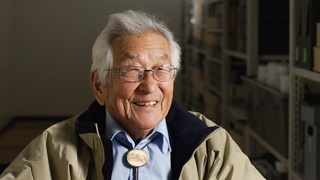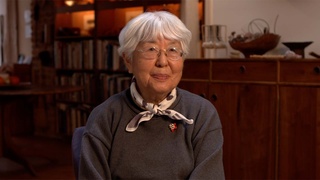Interviews
Victory Corps Work during World War II
When in Hilo, the different thing was that everybody had to do some kind of work. So we spent…I spent in my junior year half a day going to school in Honomu and half a day doing Victory Corps Work. Everybody was supposed to do Victory Corps Work.
I*: Victory Corps Work? What did that mean?
Anything that had to do with helping the war effort. So on the plantation, they asked us to go and work on the plantation. And because my dad has his own fields, our family, we worked, we helped my mother weed in the cane land. Whereas many of the…all my friends had to go to the plantation camp fields and work in their fields. So those are things that they had asked us to do as part of the war efforts.
* “I” indicates an interviewer (Akemi Kikumura-Yano).
Date: May 31, 2006
Location: Hawai‘i, US
Interviewer: Akemi Kikumura Yano
Contributed by: Watase Media Arts Center, Japanese American National Museum
Explore More Videos

Feeling prejudice while looking for jobs
(1919 - 2015) Nisei who served in World War II with the 442nd Regimental Combat Team

Generosity of the Italians
(1919 - 2015) Nisei who served in World War II with the 442nd Regimental Combat Team

Invited to teach at Harvard by his boss
(1919 - 2015) Nisei who served in World War II with the 442nd Regimental Combat Team

The riot in Manzanar
(b. 1921) Nisei veteran who served in the occupation of Japan

The Dopey bank that survived the war
(b. 1934) Award-winning Disney animation artist who was incarcerated at Topaz during WWII

Evacuated to the Jungle
(b. 1938) Philipines-born hikiagesha who later migrated to the United States.

Captured by Guerillas after bombing of Pearl Harbor
(b. 1938) Philipines-born hikiagesha who later migrated to the United States.

Grandfather picked up by US Army
(b. 1952) Former banking executive, born in Hawaii

Growing up Japanese in Hawaii
(b. 1952) Former banking executive, born in Hawaii

Father's business partner operated their farming business during WWII
(b. 1935) Sansei businessman.

Father was convinced the constitution would protect him
(b. 1935) Sansei businessman.

The lack of discussion about family’s incarceration in Amache
Sansei judge for the Superior Court of Los Angeles County in California


Her brother’s reasons as a No-No Boy
(b. 1923) Japanese American poet, activist

Her grandfather was pressured to teach Japanese
Sansei judge on the Superior Court of Los Angeles County in California
